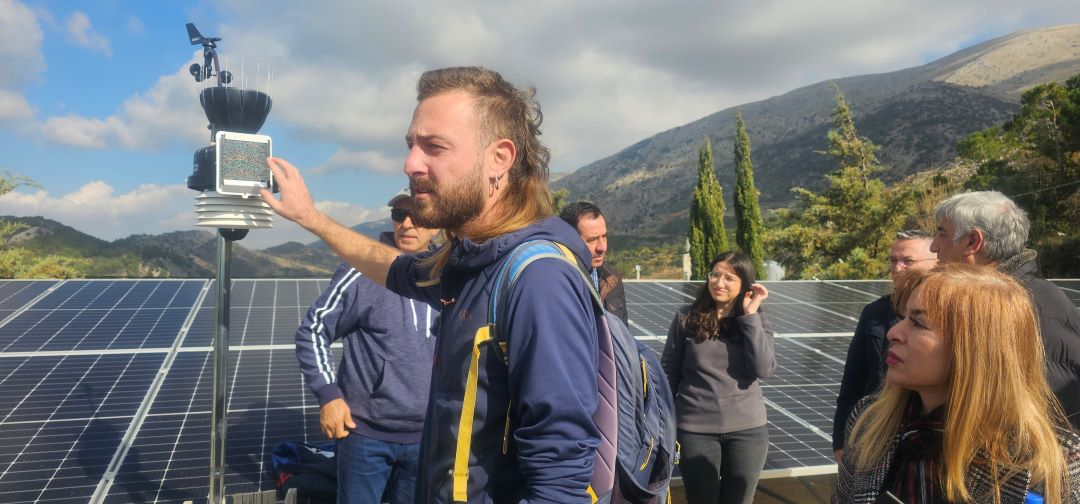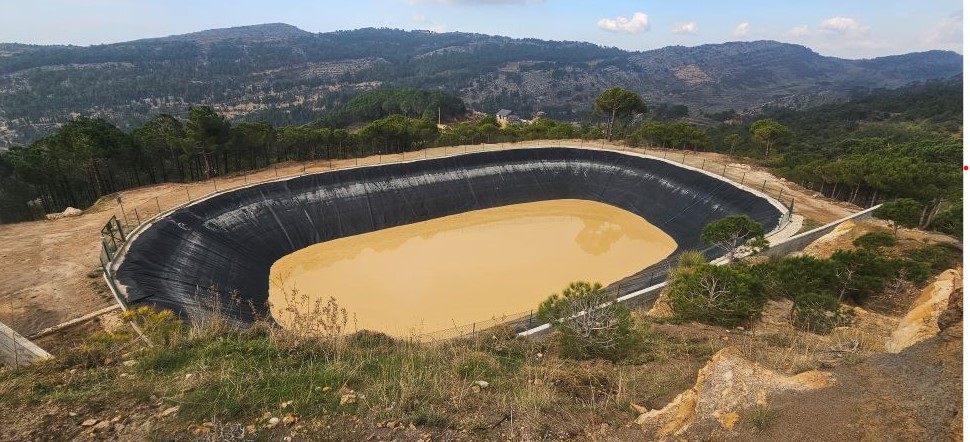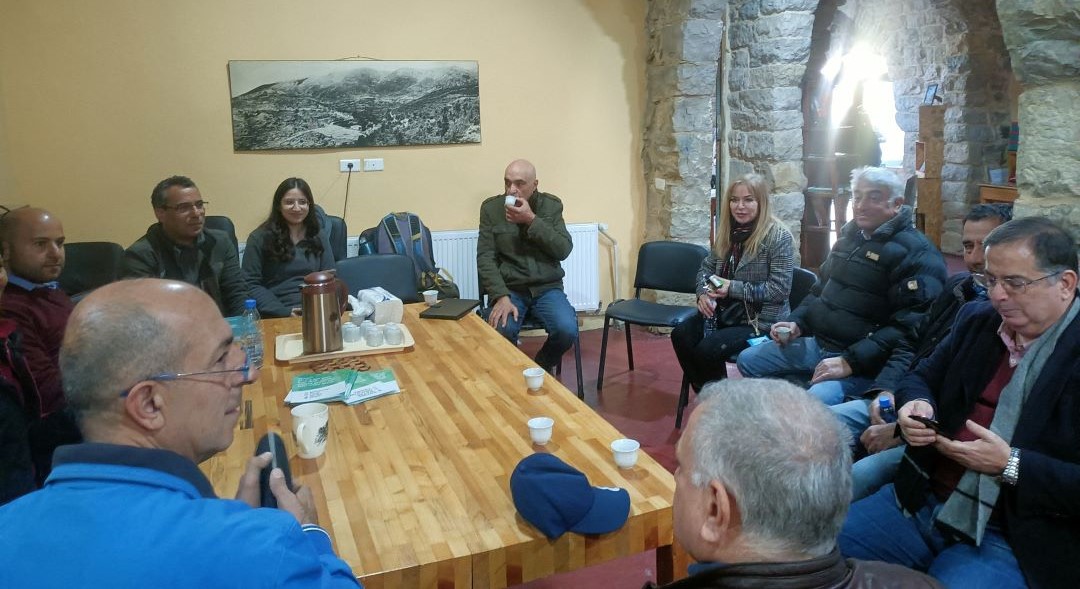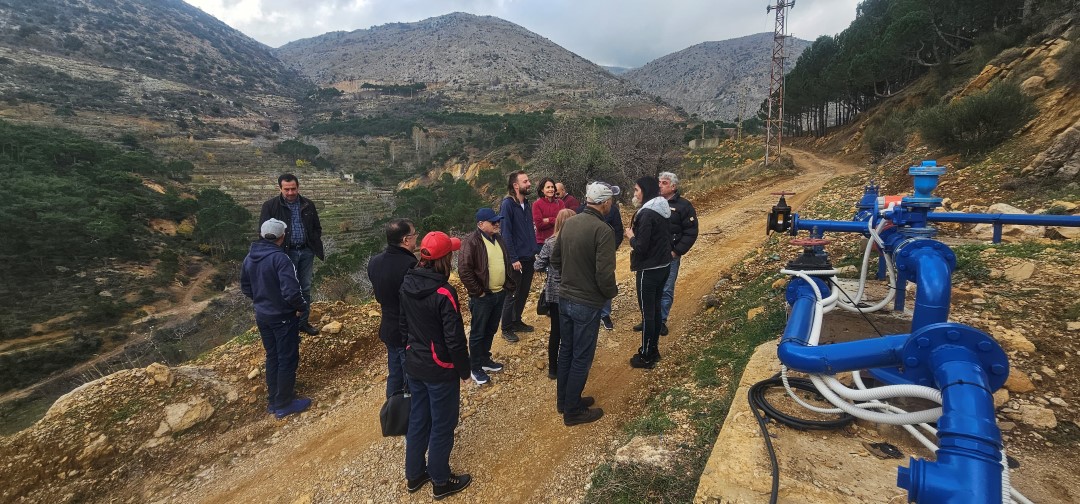Nine representatives from Lebanese institutions related to the management of water and energy resources, agriculture/food security, and environmental protection, participated in a meeting and field visit organized by the Global Water Partnership-Mediterranean on December 18, 2023.
The group visited the Shouf region of Lebanon as part of the Water-Energy-Food-Ecosystems (WEFE) Nexus Policy Dialogue conducted in the country by GWP-Med under the GEF UNEP/MAP MedProgramme, with the objective of introducing participants to practical examples of WEFE Nexus solutions that are applied in the country.
Τhe initiative aimed to encourage dialogue and facilitate the exchange of knowledge among various institutions. It also provided an opportunity to explore the advantages of implementing these solutions and to promote discussions on their replication and upscaling in Lebanon.
 The projects are applying Nexus-related solutions aiming to yield positive benefits for all Nexus sectors and the local communities.
The projects are applying Nexus-related solutions aiming to yield positive benefits for all Nexus sectors and the local communities.
The Al-Shouf Cedar Nature Reserve/Shouf Biosphere Reserve (SBR) – the largest of Lebanon nature reserves - plays a crucial role in stimulating local sustainable economic development, while safeguarding the natural and cultural heritage it depends upon. This is accomplished through a range of initiatives and projects implemented in the region under its supervision. Participants visited the SWat project, the Water, Sanitation and Conservation (WSC) project and the MINARET I project all applying Nexus-related solutions, benefitting the local communities and contributing to sustainable natural resources management.
The group firstly visited the Al Shouf Cedar Society (ACS) premises, where Dr. Nizar Hani, General Manager of Al-Shouf Cedar Nature Reserve / Shouf Biosphere Reserve (SBR), welcomed participants. He provided an overview of numerous initiatives implemented in the area, which embrace the principles of system-thinking and circular economy and yield positive and synergistic outcomes that benefit various of the Nexus sectors at the same time. These projects promote customized solutions tackling specific local needs and have a high-level of community engagement.

Within the Al Shouf region, participants visited the SWat project, the Water, Sanitation and Conservation (WSC) project and the MINARET I project all applying Nexus-related solutions.
Participants were then guided to the SWat project, which uses a remote-controlled irrigation system to address water scarcity and promote preservation of available freshwater resources, the WSC project whereby through a wastewater sludge management system they strive to reduce the environmental impact caused by WWTPs at the Barouk River watershed and the MINARET I project, which applies the WEFE Nexus approach with tangible benefits both for nature as well as local farmers. They were highly impressed by the innovative approaches and outcomes, which demonstrate how a comprehensive and strategic planning, combined with modern technologies, can effectively address trade-offs across different sectors, while simultaneously generating socioeconomic and environmental advantages.
Eng Mona Fakih, Director of Water – Ministry of Energy and Water stated: "Today, was very fruitful; we have seen the Nexus on the ground because usually we talk about the Nexus in theory so here we saw it. It can be a starting point to elaborate and integrate it in our strategies and move from small to bigger projects. We have also seen the biodiversity, the protected areas and the most important was that we had a variety of people from the Ministry of Agriculture, Ministry of Environment, CNRS, so most of the relevant stakeholders were with us which is a good start to make a dialogue together and benefit from the experience of each other. "
The joining institutions are members of the newly formed WEFE Inter-Ministerial Group, which is led by the Lebanese Ministry of Energy and Water and facilitated by GWP-Med. The Group facilitates collective engagement of relevant institutions to prioritize common solutions. These institutions offer valuable guidance to the WEFE-Inter-Ministerial Group for the implementation of the WEFE Nexus Policy Dialogue and related activities in Lebanon.
GWP-Med has been implementing activities in Lebanon since 2022 in the framework of the GEF UNEP/MAP MedProgramme, to assess the opportunities offered by the Water-Energy-Food-Ecosystems (WEFE) Nexus approach. These initiatives offer participants a chance to engage in constructive dialogue, mutual learning, and promote collaboration among projects. Additionally, the replication of best practices in other regions of Lebanon is encouraged, ultimately contributing to enhance the country’s natural resources security.

Such initiatives offer participants a chance to engage in constructive dialogue, mutual learning and promote collaboration among projects.
A short presentation of the three projects can be found here below:
SWat project: Saving Water, Growing Crops: remote-controlled irrigation system to address water scarcity and promote preservation of available freshwater resources[1].
The SWat project has successfully implemented a remote-controlled irrigation system, covering around 29 hectares, based on drip irrigation and soil monitoring, through the use of smart weather stations and humidity sensors placed strategically in the plots. It also entailed the restoration of three hill lakes and the development of a siltation removal system that utilizes stormwater runoff as its source in Mrusti area.
The interventions were preceded by a significant cadastral mapping exercise of the targeted area. This was necessary to ensure the project's sustainability by preventing any potential conflicts among farmers. Additionally, it helped determine the optimal placement of irrigation systems to ensure they always run between plots and never inside one, to minimize the possibility of any individual farmer to interfere with the pipeline, such as closing, removing, or damaging it.
Moreover, the project is in the process of establishing a Water Committee. This committee consists of local actors (farmers, cooperative members, public authorities, etc.) who are dedicated to monitoring the irrigation system and related activities and has the objective to ensure the long-term success of the project by providing support to the local authority responsible for the system and assisting the beneficiaries in developing a sustainability plan. As part of these efforts, discussions have begun regarding the beneficiaries' willingness to contribute financially to the operation and maintenance (O&M) of the irrigation system in the future, along with the development of a O&M manual and related information activities.
Water, Sanitation and Conservation (WSC) project:Wastewater treatment sludge management in the Barouk river Watershed and its Tributaries[2].
The Water, Sanitation and Conservation Project consists of a wastewater sludge management system aiming to reduce the environmental impact caused by the Wastewater Treatment Plants (WWTP) operating within the Barouk River watershed and to treat the sludge, which is currently being disposed of haphazardly, so that it can be reused in various applications.
It involves two main units:
1. the pre-treatment unit/dewatering unit within the Jdeidet El Shouf WWTP, where wet sludge, from the plant itself or from other WWTPs, will be received and dried. The dried sludge will then be transported to the second treatment unit;
2. At the composting unit in Maasser Al Shouf the pre-treated sludge will be mixed with the shredded organic matter, by-products of various agricultural activities in the surrounding areas, and composted.
Samples will be collected from received raw material and finished products and tested at recognized laboratories to assess treatment efficiency and evaluate the quality of produced materials and their suitability for various applications.
Specifically, the finished product will undergo a quality assessment to ensure its compliance with the recently issued Lebanese standards for the application of biosolids by LIBNOR, that approved the adoption of the related international standard ISO 19698:2020. Based on the results, the product will be used in suitable applications. Thorough tests will be carried out by the project in the coming years to verify the appropriateness for its intended use.
MINARET I project: The MENA Region Initiative As a model of Nexus Approach and Renewable Energy Technologies[3].
This MINARET I has successfully applied the WEFE Nexus approach with a focus on renewable energies. The project aims to contribute to the sustainable management of water, energy and agriculture and ultimately benefit more than 60 farmers and 25 farms.
Participants visited the part of the project that helped farmers in the lower part of Barouk river to have constant access to water for farming while also saving on the energy bill. In this area the project has installed a solar powered water pump that brings water upstream and is stored in water tanks. Gravity irrigation of the fields means that no additional energy is needed to transfer water to the cultivated areas.
In addition, the project has also contributed to install a PV system for water filtration at the drinking water pumping station, which allows the local population to have uninterrupted access to clean water and also to produce around 31,000 KWh of electricity.
A PV system with batteries has also been installed at the rooftop of the main building of Jdeidet El Chouf municipality, allowing for covering almost entirely its total electricity needs. Moreover, inefficient lighting system at the main building of the municipality as well as old street lighting units, have been replaced with LED lamps and LED street lighting units.
Finally, the project has also focused on collaborating with the local Jdeideh Women’s Organization with the goal of offering support in developing and managing a Revolving Fund resulting from the decreased reliance on diesel generators. The main objective through this fund is to provide loans to community households interested in investing in environmentally friendly energy technologies such as solar panels, solar water heaters, and energy efficient LED bulbs.
Acknowledgments:
The event was successfully organized thanks to the kind support of:
- Al Shouf Cedar Society (ACS), UniTrento/Istituto OIKOS, Association for Community and Environment (ACE), MORES s.a.r.l and Jdeidet El Chouf municipality, through its mayor Eng. Hisham Fatairy.
and the participation of the following experts from institutions, organizations and local administrations, namely:
Ms. Mona Fakih and Mr. Mufid Duhayni (Ministry of Energy and Water), Mr. Ramzi Saliba and Mr. Antoine Zoghby (Beirut and Mount Lebanon Water Establishment), Mr. Kassem Khalifeh (South Lebanon Water Establishment), Mr. Nassim Abou Hamad (Litani River Authority), Mr. Hussein Nasrallah (Ministry of Agriculture), Mr. Najib Abi Chedid (Ministry of Environment), Mr. Ghaleb Faour (National Council of Scientific Research), Mr. Nizar Hani (Al-Shouf Cedar Nature Reserve / Shouf Biosphere Reserve (SBR), Ms. Line Boustani and Ms. Hanan Hassan (ACS), Mr. Nicola d'Alberton (UniTrento/SWat project), Ms. Soumaya Ayadi (ACE), Ms. Joane Saade (MORES s.a.r.l), Eng. Hisham Fatairy, Mayor of Jdeidet El Chouf municipality and Mr. Gazi Jabber.
[1] The SWat project is funded by the European Union and the Swedish Postcode Foundation and implemented by Istituto Oikos, in partnership with Al-Shouf Cedar Society (ACS), University of Trento (UNITRENTO) and Association for Community and Environment (ACE). For more information: https://www.istituto-oikos.org/projects/saving-water-growing-crops-lebanon
[2] The Water, Sanitation and Conservation Project, is funded by the United States Agency for International Development (USAID) and implemented by DAI Global, LLC, and Al Shouf Cedar Society (ACS) in close collaboration with the environmental consultancy firm MORES s.a.r.l. (Management Of Resources and Environmental Solutions).
[3] The MINART I project, was funded by Sweden and implemented by Royal Scientific Society, IUCN and Horizons For Green Development. For more information: https://minaretproject.com/minaret-i/
